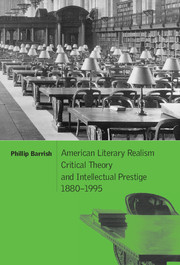Book contents
- Frontmatter
- Contents
- Acknowledgements
- Introduction
- Chapter 1 William Dean Howells and the roots of realist taste
- Chapter 2 The “facts of physical suffering,” the literary intellectual, and The Wings of the Dove
- Chapter 3 The “genuine article”: credit and ethnicity in The Rise of David Levinsky
- Chapter 4 What Nona knows
- Chapter 5 From reality, to materiality, to the real (and back again): the dynamics of distinction on the recent critical scene
- Notes
- Bibliography
- Index
Chapter 1 - William Dean Howells and the roots of realist taste
Published online by Cambridge University Press: 22 September 2009
- Frontmatter
- Contents
- Acknowledgements
- Introduction
- Chapter 1 William Dean Howells and the roots of realist taste
- Chapter 2 The “facts of physical suffering,” the literary intellectual, and The Wings of the Dove
- Chapter 3 The “genuine article”: credit and ethnicity in The Rise of David Levinsky
- Chapter 4 What Nona knows
- Chapter 5 From reality, to materiality, to the real (and back again): the dynamics of distinction on the recent critical scene
- Notes
- Bibliography
- Index
Summary
REALIST TASTE VERSUS PHILISTINISM
In the course of well-known critic James Cox's contribution to a 1991 collection of New Essays on The Rise of Silas Lapham, he makes a more-or-less parenthetic remark about the vernacular aspect of the book's protagonist: “Indeed there has always been a sense among cultivated readers of dialect that Lapham, in his swagger as well as in his speech rhythms, actually seems more Western than Northeastern.” While I do not wish to enter into the question of Western versus Northeastern swagger and speech rhythms, I do want to call attention to the group that Cox's comment both asserts and takes for granted: cultivated readers of dialect. This phrase does not evoke persons with scientific or professional knowledge of language variation, as for example a phrase like “sociolinguists” would. Instead, “cultivated readers of dialect” suggests people whose knowledge of dialect is informal, but nonetheless rigorous, as well as attained only after some experience. Because Cox specifically identifies its possessors as “readers” the knowledge in question would seem not to derive primarily from direct, person-to-person encounters with members of various American speech communities; but neither does it seem right to think of this knowledge as remote or sterile “book-learning,” as if it had come from manuals, dictionaries or textbooks.
- Type
- Chapter
- Information
- Publisher: Cambridge University PressPrint publication year: 2001



